- Homepage
- Broad beans
- Risk Factors of Parkinsons Disease
Risk factors of Parkinson's Disease
The risk factors of Parkinson's Disease include an unhappy bowel and certain toxins, many of which remain unknown.
Parkinson's Disease was originally thought to be just a head disorder in which the cells in a nucleus called the Substantia Nigra die; the SN is a part of the basal ganglia that connect many elements of the brain.
Cells that produce two important neurotransmitters called dopamine and norepinephrine are affected.
Any surviving cells in the Substantia Nigra are affected by a toxic protein called alpha-synuclein; it is produced from mutations caused by oxidative stress of the genes.
"The intestinal microbiota, that community of bacteria, viruses and yeast cells inhabiting the healthy GI has the ability to influence physiological aspects of the body; including a direct communication to the brain from the gut."
- Journal of Cell Physiology
However it has now been clearly shown that many of these neurotransmitters are also synthesised by both the cells lining the intestines and the friendly bugs in the microbiome. Following what is being called the gut-brain axis they too have a profound influence on mood, movement and degenerative changes in the basal ganglia.
Thus Parkinson's Disease is in many ways not dissimilar to the other neurodegenerative conditions; what is happening in the gut is vitally important.
Alzheimer's Disease, of course is another.
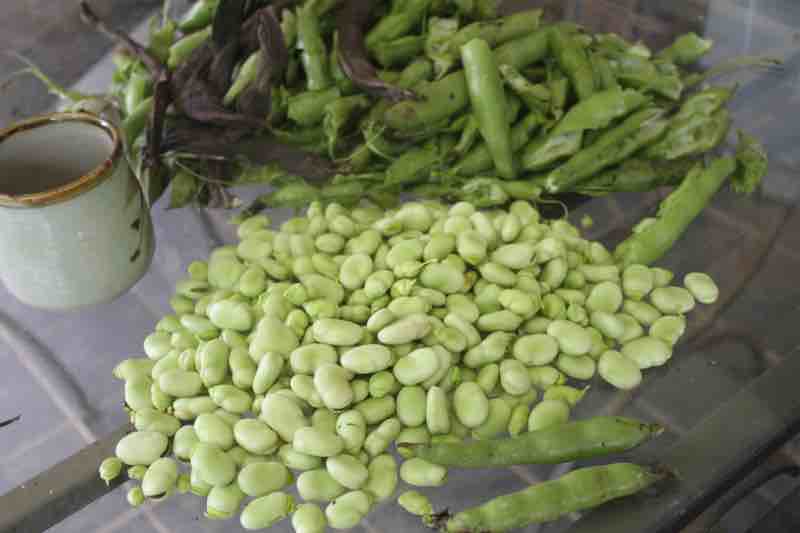 Broad beans are the only common natural source of L-dopa.
Broad beans are the only common natural source of L-dopa.Braak's hypothesis
Braak's hypothesis is that a pathogen such as a herbicide initiates Lewy Pathology[6] when it reaches the intestine. A diminished microbiota leads to a leaky gut and inflammation; that releases the toxic alpha-synuclein protein which spreads via the vagus nerve to the brain.
A balanced colony of friendly bacteria, viruses and yeast cells that should be colonising the gut mucosa is also able to synthesise dopamine; and the other hormones like norepinephrine.
Any deficiency of these neurotransmitters affects the normal functioning of the gut; in fact the whole of the body.
Gut health predicts Parkinson's Disease
- Gastroparesis means weaker than normal contractions of the muscles of the stomach; it is usually caused by a loss of nerve stimulation. The Odds Ratio is 4.6 times more likely in those suffering from Parkinson's Disease[2].
This may occur in diabetes as well as conditions like Parkinson's Disease where there is decreased dopamine; and hence its derivative norepinephrine.
Common symptoms of gastroparesis include indigestion, acid reflux and even vomiting[3].
- Irritable Bowel Syndrome is four times more likely.
- Constipation is 3.3 times more likely in those suffering from PD. Dopamine is the precursor of the norepinephrine that stimulates gut motility.
Risk factors of Parkinson's Disease
The greatest risk factors are environmental toxins that target the dopamine-producing cells in the Substantia Nigra.
Herbicides, certain pharmaceuticals and food additives all come under the spotlight. Nitrites used in processed meat and chemicals for dry cleaning have been strongly fingered in research. Scientists are saying it's largely a man-made disease.
"90,000 people are diagnosed with Parkinson’s disease in the U.S. each year. This represents a steep 50% increase from the previously estimated annual rate of sixty thousand."
- Parkinson's Foundation
Rotenone and Paraquat
Two herbicides have been strongly fingered; they cause the oxidative stress that leads to the genetic mutations that lie behind Parkinson's Disease. There are almost certainly many others.
Rotenone is supposedly a natural compound that is used in lakes and reservoirs to kill fish that are perceived as pests; it gets into our drinking water.
It is also one of the most common pesticides used in and around the home[9]; it inhibits mitochondrial respiration and causes selective degeneration in the dopamine-producing neurons in the brain.
Rotenone also causes alpha-synuclein clumping.
Paraquat is used to kill weeds and dry off potato haulms just before harvesting. Residues are left in the food we eat.
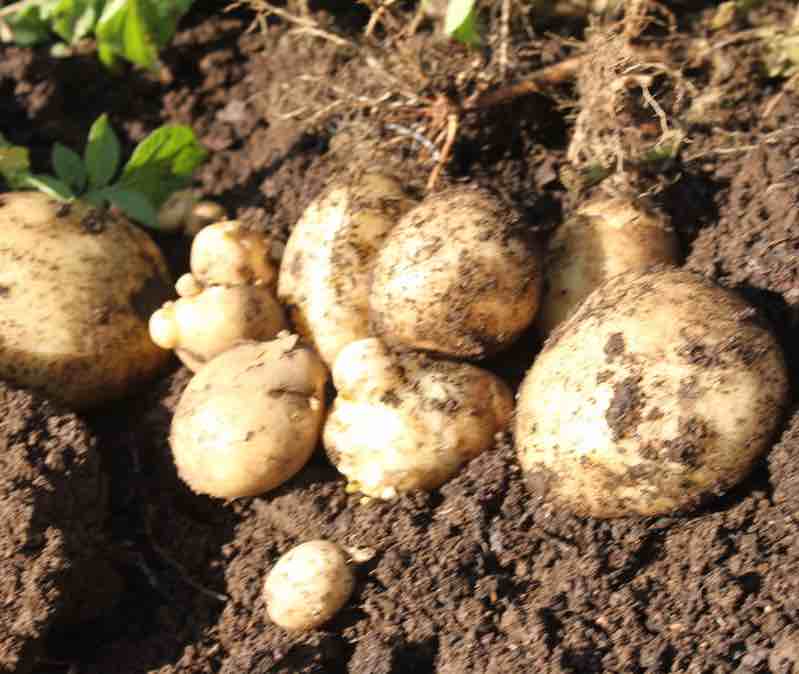 Organic, new potatoes are not glycemic and have not been sprayed with Paraquat.
Organic, new potatoes are not glycemic and have not been sprayed with Paraquat.Rotenone-poisoned rats
In Egypt where fava beans are still one of the most popular foods, researchers gave extracts of the legume to rats that had been specifically poisoned with rotenone to destroy the dopamine neurons in the brain.
Both seeds and even more so the sprouts were found to improve motor function and raised dopamine levels in the brain.
On histological examination the rats treated with the sprout extract were found to have a low number of degenerated neurons; this is the first evidence that fava beans actually protect the Substantia Nigra basal ganglia in the brain against toxic chemicals[10].
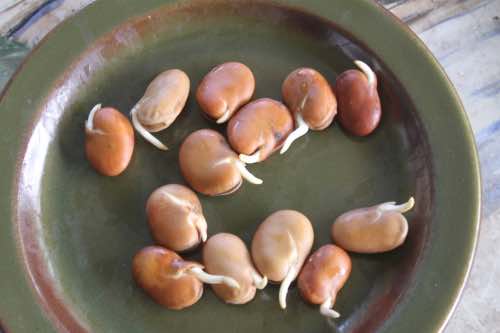 Sprouting broad beans also known as favas
Sprouting broad beans also known as favasDry-cleaning agents
Certain alkyl halides used in dry-cleaning have now been proved to be amongst the many toxic chemicals that destroy the cells in the Substantia Nigra[8]. Young people are particularly vulnerable and for unknown reasons decades after exposure have a far higher prevalence of Parkinson's Disease.
Antipsychotics
Some antipsychotics used for the treatment of schizophrenia, bipolarism and depression for example block the dopamine receptors; they may cause the signs and symptoms of Parkinson's Disease.
Beta-carotene is protective
A Japanese study found that those eating foods with large quantities of beta-carotenes had 56% protection compared to those having the smallest amounts[1]. Sweet potatoes are the mainstay of the people in Okinawa; it is one of the five Blue Zone countries where longevity is the word.
Beta-carotene is the precursor of vitamin A.
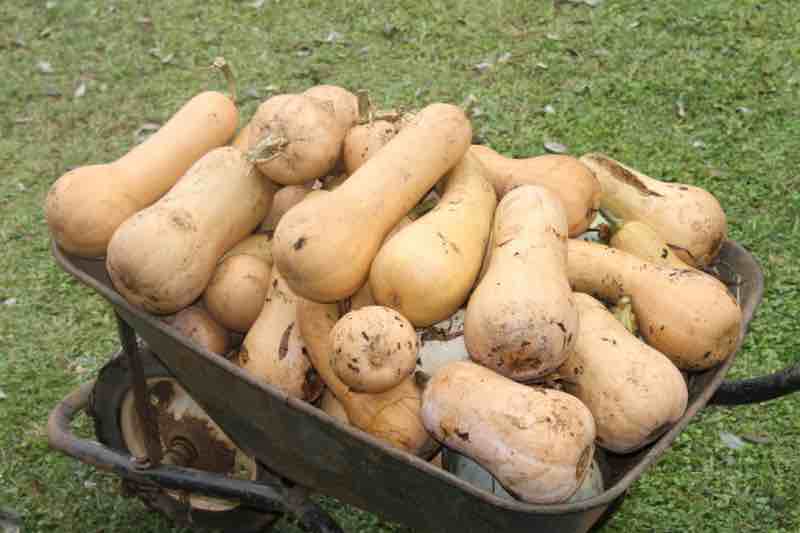 Butternut is an excellent source of beta-carotene.
Butternut is an excellent source of beta-carotene.Vitamin B6
Vitamin B6 plays an essential role in over 100 enzymatic reactions in the body; one of them is the synthesis of dopamine in that nucleus in the brain called the Substantia Nigra.
Vitamin B6 is one of the ubiquitous nutrients; it is found in many different foods and nobody eating even an average diet should be deficient. Yet researchers found that 49% of elderly folk in nursing homes had low levels.
A deficiency of vitamin B6 is thus certainly one of the risk factors of Parkinson's Disease.
This is perhaps because vitamin B6 is needed in six different forms; pyridoxine is the best known but there are five others.
- Vitamin B6 foods
- Frailty syndrome and vitamin B6; slowness of gait is central to Parkinson's Disease.
Loneliness
Dr Julianne Holt-Lundstad has found that loneliness affects our wellness more severely than obesity or smoking half a pack of cigarettes a day; and that social connectedness is associated with a 50% greater odds of surviving[11].
In particular she reports that "being lonely makes Parkinson's Disease worse."
What does Parkinson's disease do?
Parkinson's Disease causes tremors, tightness of the muscles and loss of balance; and slowness of gait, also a typical feature of Frailty Syndrome. As dopamine levels decrease so do the normal bowel movements.
Weakness of skeletal muscles causes the trunk to lean forwards; to compensate those suffering from PD tend to take quick, short steps known as festination to keep their balance. They are more likely to suffer from back pain.
As the levels of dopamine drop in the early hours, long after medication or a meal of broad beans there may be very painful cramps in the calf muscles and feet.
Anyone can experience muscle cramps but they are more usually associated with mineral and vitamin K2 deficiencies; and profuse sweating in the hot summer months.
But in those folk with low levels of dopamine they occur in the winter too.
The material expressed on this page is gleaned from the nutritional and environmental literature; it is clearly referenced. A plain distinction is made between the author's opinion and that which is scientifically proven. When in doubt consult your health professional.
To suggest a correction or clarification, write to Dr Bernard Preston here. Contact.
Early signs of Parkinson's disease
- A resting tremor in the hand or chin is one of the early signs of Parkinson's Disease.
- Changes in one's handwriting is common; the script is made smaller and less clear.
- Easily confused with Covid there may be loss of smell of common foods like garlic, limes and ginger.
- Jerking movements during sleep are common.
- The neck, arms and legs become stiff; and don't swing normally when walking.
- Heartburn, bloating and constipation are common signs; and are associated with more rapid progression of the disease.
- A change in one's voice is another hallmark; it becomes softer and others have difficulty hearing you.
- Loss of facial expression is another sign; always looking serious.
- The loss of norepinephrine, synthesised in the body from dopamine may mean your blood pressure doesn't rise when standing up; you feel faint and could fall.
- When walking and standing you start to lean forwards.
- Painful night cramps in the foot and calf muscles.
Walking
Researchers have found that those who walk a lot are far less likely to suffer from Parkinson's Disease; 60% and more. However they are not sure if exercising less is an early sign of the condition, one of the causes or if taking to the streets actually helps prevent PD.
Whatever walking is so beneficial for many conditions, we should get out tackies on and head for the hills in any case.
I cured my Parkinson's disease
Few things are more scary than the start of an uncontrollable, resting tremor in the hand when you are still in your forties; and the neurologist says it could turn into Parkinson's Disease.
Severe constipation had always been a problem, ever since childhood; not many years after the tremor started, I began also to get severe acid reflux. Several nights a week I would have to sit up in bed groaning and could only sleep on my left side.
There were mental changes too. I could no longer find a tool, book or spectacles even though they were right in front of me under my eyes. I had difficulty noting the details of what people were saying.
Once when soaring I could not see the airfield even though it was immediately beneath me; I gave up flying.
Severe night cramps in the calf muscles and feet began; in the winter too.
There was no formal diagnosis of PD; but looking back I can see it was part of a pattern of change in my brain and body.
- I dealt with the constipation. It meant a great increase in the fibre in my diet; more than the recommended 35 grams. Greens at least twice a day was particularly helpful, as was regular enjoyment of beets; avoidance of all refined grains.
- I never drank coffee after dinner, gave up beer and started eating smaller, simple suppers.
- I was introduced to the importance of the microbiome and started making my own kefir, sauerkraut and homemade wines; in particular various meads using honey from my hives.
- At the time coincidentally I took a job in Holland which meant cycling to and from work for an hour each day. I now walk daily, especially after supper; everything was complicated by being prediabetic.
- Again seemingly unrelated I was introduced to young fresh broad beans. I had previously a lifelong aversion to the old and starchy favas as they are sometimes called; they are the only common source of pharmaceutical quantities of L-dopa, the treatment for PD.
- I started growing my own potatoes and refused to eat commercial spuds which I feared had been sprayed with Paraquat.
- I drank only rainwater to be sure there was no Rotenone or other chemicals.
- I became a healthy nut; fascinated by the Blue Zones of the world I developed a passion for growing and cooking my own food.
Am I cured? No, of course not but my tremor, cramps in the lower legs and gut issues are well under control. Approaching my 78th birthday I take no medication whatsoever.
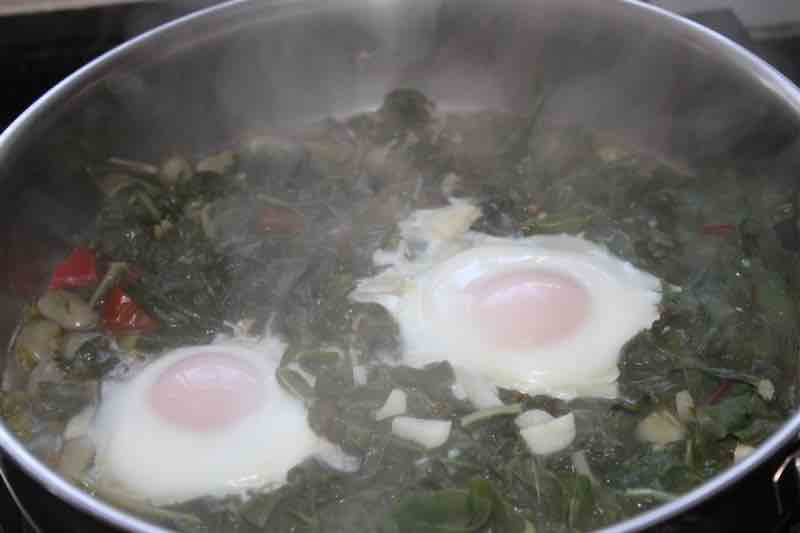 Eggs Parkinson's Disease is my daily breakfast. The broad beans look like small grey ticks.
Eggs Parkinson's Disease is my daily breakfast. The broad beans look like small grey ticks.This essay on the risk factors of Parkinson's Disease covers the many toxins we are exposed to from our food and the environment; and the lifestyle that can successfully manage the condition without drugs.
The journey continues
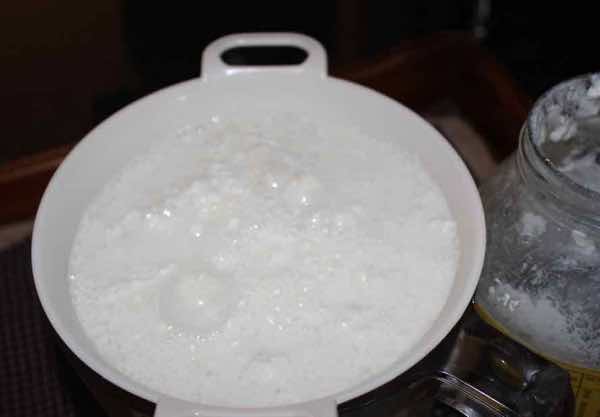 Kefir is the simplest natural probiotic.
Kefir is the simplest natural probiotic.I have never been formerly diagnosed with Parkinson's Disease though, looking back many of the signs and symptoms of low dopamine levels were starting. Still today I can only drink soup or porridge using a large spoon if I have not recently eaten broad beans; otherwise there is an embarrassing spillage.
Quite independently I started making certain changes that clearly have benefited in any case and may have slowed the progression of the disease. Growing sufficient favas so that I could freeze them and have five beans every single day has greatly contributed to reducing the tremor in my right hand and the night cramps in my legs.
Discovering that sprouted broad beans have up to twenty times more L-dopa has helped.
Making my own kefir daily contributed enormously to the epigastric pain; but I still feel nauseous and vomit very occasionally at night. Gastroparesis is likely. A change from commercial beer to homemade mead has helped; it's a natural probiotic.
We grow most of our own food and bake our own bread from freshly-ground wholemeal; and buy much of our dairy and meat from an organic farmers' market. I enjoy bacon, preserved with nitrites only on "high and holy days."
Actually without even knowing it, I intuitively began to deal with the risk factors of Parkinson's Disease. The scientists are now saying that it is mostly a man-made disorder.
 Homemade mulberry mead.
Homemade mulberry mead.Dealing with the risk factors of Parkinson's Disease has been one of the greatest journeys of my life; it has been fun and the hard work endured. I have recently embarked on my 78th orbit of the sun; and still take no pharmaceutical L-dopa or any other medication.
Broad beans are the only known source of pharmaceutical levels of the phytonutrient.
Unashamedly I am a disciple of Hippocrates.
"Let thy food be thy medicine, and medicine be thy food."
Hippocrates (460 - 370 BC)
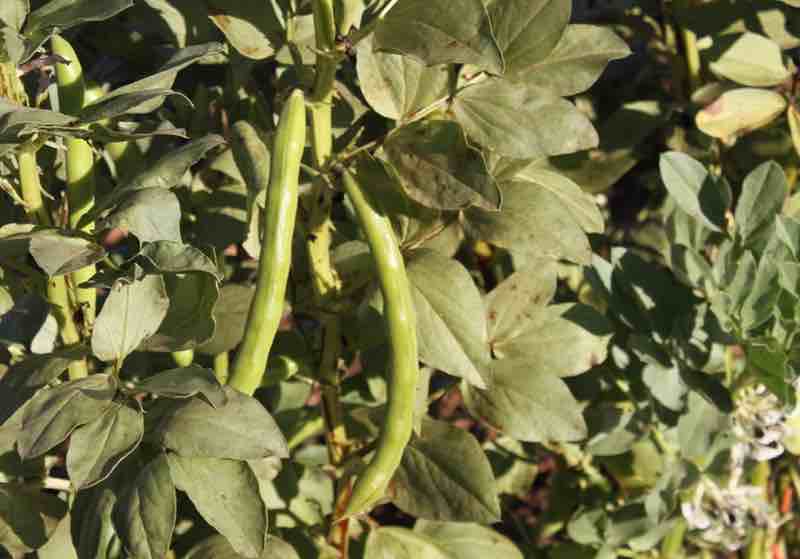 Growing broad beans requires the patience of Job.
Growing broad beans requires the patience of Job.Autonomic dysfunction and PD
Constipation and symptoms such as rigidity when standing up are controlled by the autonomic nervous system. They affect 63% of those suffering from early-onset Parkinson's Disease (EOPD); and are associated with a three times higher risk of early death.
EOPD is defined as at least two of these starting before the age of 50.
- A resting tremor
- Rigidity
- Slowness of movement
- Changed postural reflexes
The most serious autonomic dysfunctions were constipation and postural difficulties when standing up.
- Dietary intake of antioxidant vitamins and risk of Parkinson's disease
- Four GI Conditions that May Predict Parkinson's Disease
- Gastroparesis
- Parkinson’s Disease: Causes, Symptoms, and Treatments
- Neurotransmitters: The critical modulators regulating gut-brain axis
- Lewy pathology in Parkinson’s disease
- Epidemiological Trends Strongly Suggest Exposures as Etiologic Agents in the Pathogenesis of Sporadic Alzheimer's Disease, PD, Diabetes Mellitus, and Non-Alcoholic Steatohepatitis
- Is Most Parkinson's Disease Man-Made and Therefore Preventable?
- ScienceDirect: Rotenone
- Methanolic extracts of a selected Egyptian Vicia faba cultivar mitigate the oxidative/inflammatory burden and afford neuroprotection in a mouse model of Parkinson’s disease
- Loneliness: Time for Medicine to Address This Risk Factor
When browsing use right click and "Open Link in New Tab" or you may get a bad gateway signal.
Newsletter
Our newsletter is entitled "create a cyan zone" at your home, preserving both yourself and Mother Earth for future generations; and the family too, of course. We promise not to spam you with daily emails promoting various products. You may get an occasional nudge to buy one of my books.
Here are the back issues.
- Lifestyle and ideal body weight
- What are ultra-processed foods?
- Investing in long-term health
- Diseases from plastic exposure
- Intensive lifestyle management for obesity has limited value
- A world largely devoid of Parkinson's Disease
- The impact of friendly bacteria in the tum on the prevention of cancer
- There's a hole in the bucket
- Everyone is talking about weight loss drugs
- Pull the sweet tooth
- If you suffer from heartburn plant a susu
- Refined maize meal and stunting
- Should agriculture and industry get priority for water and electricity?
- Nature is calling
- Mill your own flour
- Bake your own sourdough bread
- Microplastics from our water
- Alternative types of water storage
- Wear your clothes out
- Comfort foods
- Create a bee-friendly environment
- Go to bed slightly hungry
- Keep bees
- Blue zone folk are religious
- Reduce plastic waste
- Family is important
- What can go in compost?
- Grow broad beans for longevity
- Harvest and store sunshine
- Blue zone exercise
- Harvest and store your rainwater
- Create a cyan zone at your home
Did you find this page interesting? How about forwarding it to a friendly book or food junkie? Better still, a social media tick would help.
- Homepage
- Broad beans
- Risk Factors of Parkinsons Disease
Address:
56 Groenekloof Rd,
Hilton, KZN
South Africa
Website:
https://www.bernard-preston.com